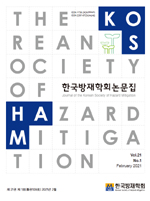대규모 농업용저수지의 농업용수 공급 운영 관리에 따른 이수안전도 평가
Evaluation of Irrigation Safety by Operation Management of Water Supply from Large Scale Agricultural Reservoirs
- 한국방재학회
- 2. 한국방재학회 논문집
- 21권1호
-
2021.02189 - 198 (10 pages)
-
DOI : 10.9798/KOSHAM.2021.21.1.189
- 73

최근 기후변화로 인하여 가뭄이 빈번하게 발생하고 이에 따른 농업용수 부족을 겪고 있다. 하지만 대부분 농업용 저수지는 10년 빈도 한발시의 공급량을 기준으로 설계되어 있어;최근 연속적인 가뭄으로 낮은 저수율을 나타나고 있다. 따라서 본 연구에서는 가뭄에 대응할 수 있는 최저 관리 저수율을 설정하기 위해 나주호를 대상으로 물수지 분석을 수행하고 평년 운영 관리에 따른 부족수량 변화를 평가하고자 한다. 그 결과;평년 운영 관리 저수율이 높아질수록 영농기 초기 저수율이 증가하였고;연평균 농업용수 부족수량이 감소하였다. 또한;평년 저수율 관리에 따라 가뭄 년도 햇수와 그 심도를 저감 시킬 수 있는 것으로 나타났다.
Due to recent climate change;droughts occur frequently;thereby causing a shortage of agricultural water. However;supplies to most agricultural reservoirs have been designed assuming that droughts occur at a frequency of 10 years. Therefore;continuous drought has led to low storage rates. Thus;in this study;a water balance analysis was performed on the Naju reservoir;and the changes in the water shortage according to the minimum storage rate restriction management to cope with drought were evaluated. As a result;a higher management storage rate level results in a higher initial storage rate in the next year;thereby decreasing the annual average shortage. In addition;it shows that a decrease in the frequency of drought and its intensity can be reduced according to the minimum storage management during wet years.
Ⅰ. 서론
Ⅱ. 재료 및 방법
Ⅲ. 결과 및 고찰
Ⅳ. 결론
(0)
(0)